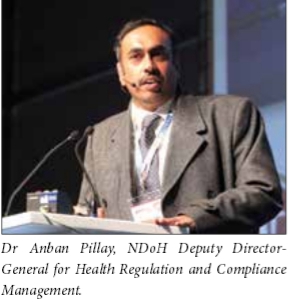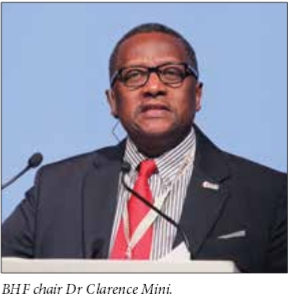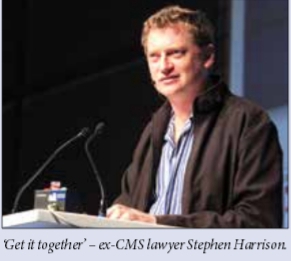Serviços Personalizados
Artigo
Indicadores
Links relacionados
-
 Citado por Google
Citado por Google -
 Similares em Google
Similares em Google
Compartilhar
SAMJ: South African Medical Journal
versão On-line ISSN 2078-5135
versão impressa ISSN 0256-9574
SAMJ, S. Afr. med. j. vol.105 no.9 Pretoria Set. 2015
http://dx.doi.org/10.7196/SAMJNEW.8560
IZINDABA
Contested PMB amendments - 'funders the chief beneficiaries'
If promulgated as originally proposed, 'shortsighted' changes to the Medical Schemes Act, in particular sections of Regulation 8, will financially hurt both beneficiaries of medical schemes and many private practitioners - via inadequate funder payments for prescribed minimum benefits (PMBs).
In spite of reassurances to the contrary by both the Board of Healthcare Funders (BHF) and Dr Anban Pillay, Deputy Director-General for Health Regulation and Compliance Management at the National Department of Health (NDoH), most doctor groups remain deeply wary of the arbitrary way in which medical aid rates have been linked to 'deeply flawed' 2006 National Health Reference Price List (NHRPL) tariffs (adjusted for the consumer price index (CPI)). The proposed legal amendment, induced by decade-long pricing strife and intransigence on the part of most stakeholders in the private healthcare sector, errs on the side of funders, allowing (but not obliging) them to negotiate tariffs with any healthcare provider for which no co-payment or deductible is payable by the member. PMBs cover both chronic and catastrophic conditions suffered by medical scheme members and are intended to offer them a measure of financial protection. However, since the 'provider-cost deficient' 2006 NHRPL list was drawn up, there have been numerous advancements in medical technology and procedures that are not included. This means that unless it is updated, patients stand to no longer be funded for optimal and up-to-date treatment.

Where's the science? -SAMA
Dr Mzukisi Grootboom, Chairman of the 17 000-member South African Medical Association (SAMA), says the amendment is 'difficult to explain', given that the Minister of Health failed to give the profession and patients the scientific basis upon which he is proposing the amendments.
The oft-heard rhetoric, both from funders and politicians, was that 'paying in full' (the existing and historically much-contested regulatory wording for PMBs) amounted to a 'blank cheque' for doctors. However, the truth was that this would 'unfortunately affect not only our patients but also a lot of colleagues in private practice by forcing them to charge prices at a level below the cost of running their practices'.
Grootboom contends that the minority of doctors who funders claim charge way more than the average medical scheme rates, or who fraudulently abuse the system, can easily be identified and held to account. Using this minority to justify legislation based on an outdated, flawed and unscientific price list would simply chase doctors out of the profession. Any further erosion of the widening historical gap between what medical aids pay doctors and what it costs doctors to deliver services would damage overall healthcare delivery, threatening the very existence of private practice. Doctors in private practice, who a reading of the latest Council for Medical Schemes (CMS) annual report showed charged on average between 80% and 150% of medical aid rates, would 'simply leave the profession, change professions or go overseas', he claimed. Grootboom said that feedback from the funding industry was that medical aids were only prepared to pay an 'unsustainable' 30% of the costs of running a medical practice. He described those few GPs and (mainly) consultants who charged three or four times the medical aid rates as 'outliers', stressing that there were mechanisms in the current system to deal with them, 'particularly those medical aids that have well-resourced IT platforms and can document practices that grossly abuse. There is also the HPCSA [Health Professions Council of South Africa] that can deal with unethical conduct,' he added.
Definition of 'pay in full' remains unresolved
Health minister Dr Aaron Motsoaledi, chief architect of the proposed amendment to Regulation 8 of the Medical Schemes Act, and the BHF (which warmly welcomes the change) claim that doctors do have a 'blank cheque' under the current Act. For a variety of complex legal reasons, no court has yet ruled on or engaged with all the facts behind whether the legislator meant that medical aids must 'pay in full' what the doctor charges - or what medical schemes set as payment rates. In practice it is the patient who most often suffers, paying for the shortfall regardless of whose interpretation pertains on the day. Motsoaledi's draft tries to introduce greater certainty by linking medical aidrates to the 2006 NHRPL tariffs (adjusted for the CPI). Healthcare economist Alex van den Heever warns that if passed, the amendment will not only reduce financial risks for medical schemes but shift the cost burden further onto consumers - who have virtually no power to negotiate with healthcare providers.
Van den Heever, Chair of Social Security Administration and Management Studies at the University of the Witwatersrand School of Governance, said that 'no country in the world expects consumers to fight at the point of service about a price for healthcare', and described the regulations as 'a gift to vested interests'. Pillay said that the aim of the draft regulation is to protect medical schemes from open-ended liability for PMB claims. At the BHF annual conference held in Cape Town in July, he told delegates that a recent overview of private health insurance in South Africa (SA) by the Organisation for Economic Co-operation and Development (OECD - 34 countries with market economies) showed that SA was second only to the USA in respect of high prices.

Pillay rolls out evidence of 'abuse'
Displaying a graph of local healthcare provider billing for PMBs v. non-PMBs, Pillay said that the variance dramatically illustrated how providers hiked their bills for PMBs: 'It's like walking into a restaurant and there are no prices on the menu. The waiter says, "Choose what you like, but when you leave I'll decide what you have to pay.'" He said the current system meant that funders had to pay whatever was billed, with no opportunity to negotiate. While he agreed that a small subset of healthcare providers was abusing the payment system, he said this had 'a massive impact' on the medical schemes involved. 'It's about dealing with this behaviour and its impact. More and more providers will start doing it - until it becomes the norm. We want a reimbursement system that is fair to both patients and providers, and one that results in no co-payments,' he asserted.
He claims that the CMS will protect consumers by not approving medical schemes' benefit packages if they fail to make adequate provision for members.
Grootboom and his colleagues believe that one of the chief motivations behind the current Competitions Commission Healthcare Inquiry is to find reasons to justify price control. They cite the current amendment as strong circumstantial proof of this, and have launched a patient advocacy campaign outlining the 'iniquitous history' behind the NRHPL from the time medical aids began in SA (in 1947) to the 'discredited' changes in 2006 to the proposed set-up. SAMA says that the 2006 schedule was 'anything but' the cost-based tariff it was disingenuously disguised as, and was implemented despite loud protestations by healthcare professionals. Not only did it fail to reflect realistic prevailing costs at the time, but the technological and scientific advances in healthcare had resulted in more than 1 000 new services becoming available since 2006. The net result was that 'the public needs to understand that doctors cannot be expected to charge for their services at below the cost of running their practices'.
Amendment threatens private practice - as we know it
'We have to make a living, and the unintended consequence of this is that those who remain in the profession have to work longer hours while still being unable to fund their retirement. A few [doctors] have even resorted to unacceptable and/or fraudulent behaviour, driven by trying to make ends meet. The most shocking thing about this is that we've yet to see any evidence of alleged widespread abuse or trends. It would be far more helpful if the NDoH, rather than play politics while dancing to the tune of different funders, showed us the evidence'.
Dr Tony Behrman, CEO of the Independent Practitioners Association Foundation, predicts that if passed 'as is', the amendment will result in healthcare providers quickly agreeing to charge what medical schemes are willing to pay - because patients will simply refuse to pay out of their own pockets. 'The market will rule, and specialists and hospitals will find their bills remain unpaid because the average South African can't afford the excess,' he said.
Pillay conceded that neither doctors nor hospitals were consulted, explaining 'this is our attempt to solve the problem - we're wide open to alternatives over the next 3 months while the draft is open for comment and input'.
Grootboom said that one of the key failures of the legislative funding framework was the lack of a risk equalisation fund and enforced enrolment (where all employees have to contribute towards a fund to widen the risk pool). 'Somebody needs to monitor how much burden of disease a scheme is dealing with and then set aside a relevant risk fund. These are all key deficiencies - the minister, for political reasons, is actually missing the point.'
Patient advocacy group Section 27 said that the proposed amendment was a 'step backwards' and diminished patient access to healthcare services, pushing more South Africans towards dysfunctional public healthcare. Several patient advocacy groups, SAMA and the South African Private Practitioners Forum (SAPPF) believe that the amendment is unconstitutional. SAPPF CEO Dr Clive Archer said that the NDoH's submission to the Competition Commission inquiry spoke about an independently produced, cost-based tariff. This was at wide variance with the proposed legal amendment. 'The Department's health inquiry submission recommends that the state establish a negotiation framework to support collective bargaining using a cost-based structure as a point of departure,' he said. Archer described the proposed amendment as 'retrogressive, undermining the whole ethos of the current system, which is to protect families from massive medical expenses and prevent dumping on the state'.
Anaesthetists awaken colleagues to another problem
Meanwhile, the South African Society of Anaesthesiologists said that another amendment to Regulation 5 of the Medical Schemes Act, while less publicly reported, required attending doctors to provide a 'discharge summary' to medical schemes for all ailments, including PMB conditions, for hospital and doctor (potentially all medical) bills. While medical bills could be submitted at present using multiple digital platforms, these summaries were not catered for in current medical scheme systems. There was therefore 'every possibility and likelihood' that schemes would simply not reimburse medical practitioners 'for months or years', pending finalisation of such reports. These reports may also contain patient confidential information the sharing of which requires specific consent. Grootboom said that this lent statutory authority to an already worrying trend among medical schemes to get doctors to perform administrative functions on their behalf. SAMA was examining the legal validity of all the intended amendments, as well as the practical implications for both its members and their patients, and would soon be submitting this to the minister.
BHF chair Dr Clarence Mini, speaking at the end of the July conference, said that BHF-initiated task teams would focus on 'inclusive solutions and consensus' during the draft amendment input period. He appealed to all service providers to take part in creating a 'road map' that would provide fair remuneration to all parties and avoid patients sitting with co-payments. The BHF has been in tariff negotiations with the South African Dental Association (SADA) for the past 18 months, and recently met with SADA to evaluate coding changes and set up a risk advisory panel. Pushed on when the 'road map' would be finalis Mini said that a draft would 'probably be re between mid-September and mid-Octob describing it as 'open-ended'.
Chris Bateman
Healthcare prices architect in last-gasp appeal

A former legal adviser to the CMS, who drew up the much-contested 2006 NHRPL, has told healthcare providers and funders to 'man-up' and bury the hatchet - or face ceding pricing control to government.
Stephen Harrison, a 9-year veteran of the CMS (2000 - 2009), has watched with growing exasperation for more than a decade as the players now suddenly and potentially most affected by his price referencing (in terms of the new Regulation 8 amendment) continue to grandstand while failing to move towards any solution or mutual accommodation.
Now a lecturer in emergency medicine at the Cape Peninsula University of Technology, Harrison bluntly told the July BHF conference that the 'degree of hopelessness and despair' displayed in the private healthcare industry's submissions to the Competitions Commission healthcare inquiry invited 'a radical interventionist approach' from government.
With the Regulation 8 amendment - probably due for enactment early next year - now basing PMB pricing on the 2006 NHRPL and, in his opinion, likely to benefit funders at the cost of patients and providers, his message to delegates was clear.
'For goodness' sake, let's actually resolve this impasse and come up with a practical solution. This is an opportunity for a small group of leaders in the health sector to come together. The publication of the amendment provides an opportunity to do that. I'm not optimistic that this [regulation] is a sustainable way forward - historically we've never addressed the heart of the problem, we've just introduced more subterfuge in the industry. We need a reality check - and to admit that we're now at a crossroads.' Earlier he had said that private healthcare sector leaders needed to 'stand up ... remember we're all in this boat together'.
While he accepted the bona fides of the NDoH in introducing the legislative amendment to attain a greater degree of certainty in the market - and that it did not intend to increase co-payments by patients - the net effect of Regulation 8 would be to create greater disparity between what providers charged and what medical schemes paid. The gap cover market would burgeon, and patients would either be denied care or revert to the public sector.
'You can argue the long-term reductionist effect on premiums (as schemes save on PMB payout amounts), but the crunch will come when the consumer gets ill and needs cover for PMBs. The original intention for PMBs has been lost. If you go back to the Memorandum on the Objects of the Medical Schemes Bill of 1998, this was to protect necessary and cost-effective care and not to shift patients arbitrarily to a public hospital when their benefits are depleted.' The amendment would create a significant barrier to necessary care and flouted Section 2 in the Constitutional protection of Section 27 - that government would take reasonable, progressive legislative and other measures within its resources to achieve the progressive realisation of access to healthcare. 'To me this is a retrogressive step in the protection of rights of consumers. The main roleplayers are intractable and in significantly dug-in positions,' he stressed. The protagonists needed to move from unilateral action, confrontation and 'adversarialism' to joint problem-solving, from competition for slices of the pie to a focus on enlarging the pie, and from entrenched respective positions to respective interests as departure points. Harrison advocated 'Codesa-type' talks between the adversaries, saying that SA had a rich history of resolving seemingly impossible disputes.














